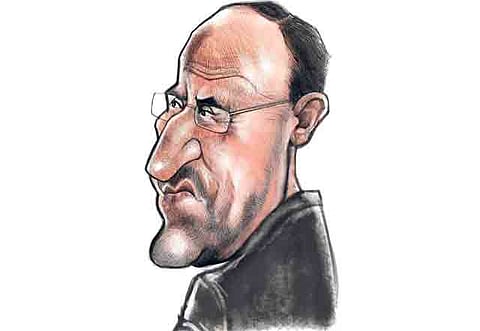Al Maliki is at odds with Syria
The Saudis believe the Iraqi premier has worked to reduce their influence in Iraq

Iraqi Prime Minister Nouri Al Maliki seemed to bring relations between his country and Syria back to square one last week, as he accused Damascus of trying to restore the Baathists to power in Iraq. His comments came after members of the disbanded Iraqi Baath Party held a public conference in Syria on Thursday together with exiled tribal leaders, intellectuals and members of the Iraqi Communist Party, for the first time since the war of 2003.
The thought of the presence of so many Iraqi dissidents in neighbouring Syria is enough to keep the Iraqi premier awake at night. He is very concerned about their intentions; fearing that they are plotting to bring him down, just as he and his comrades dreamed of bringing down Saddam Hussain during long nights spent in Damascus when exiled to the Syrian capital during the 1980s and 1990s.
The Syrians, meanwhile, feel they have been stabbed in the back by Al Maliki, who they sheltered for years, and then worked hard to promote within the international community as an able Iraqi leader and not just an Iranian stooge or a creation of the Americans — as some in the Arab world think he is. The Syrians, after all, sent an ambassador to Baghdad during Al Maliki's tenure, greatly increasing his legitimacy in the eyes of ordinary Iraqis — especially Sunnis — who had harboured very negative views about the man. Al Maliki went astray, they claim, when shortly after visiting Damascus last summer, he accused the Syrians of harbouring two Iraqi fugitives believed to have masterminded coordinated attacks in Baghdad that killed more than 100 people. Diplomatic relations were then severed between Damascus and Baghdad.
The Syrians believe, for Damascus — which still promotes a strong brand of Arab nationalism through the ruling Baath Party — to open an embassy in Baghdad is very different from when this is done by pro-western countries like Jordan, for example. For Syria to withdraw its ambassador, therefore, is very symbolic, and speaks volumes about how Al Maliki is viewed by Iraq's neighbours. .
General discontent
Saudi Arabia is also less than impressed by the Iraqi prime minister. The Saudis believe that Al Maliki has worked relentlessly to curb their influence in Iraq, for the benefit of Iran. He has done this by refusing to issue a general amnesty, thereby sidelining Iraqi Sunnis; pushing ahead with de-Baathification laws that harm the Sunni community; and keeping Sunni politicians away from the political process. The Syrian-Saudi understanding — with rewards reaped in Lebanon — is very disturbing for Al Maliki. This understanding, Al Maliki believes, helped Eyad Allawi win 91 out of 325 seats in the recent parliamentary elections, and led to the defeat of Shiite parties such as the Supreme Iraqi Islamic Council, which lost 70 of its parliamentary seats. Allawi was not very discrete about this; having visited both Damascus and Riyadh prior to the elections and publicly disclosed his intention of bringing down Al Maliki, with the help of the Syrians and Saudis.
Had Al Maliki lived in a different era, when Saudi Arabia was not as strong, rich and influential as it is at present, then he would have unleashed his anger at the Saudis as well as the Syrians last week. But Riyadh remains a red line for the prime minister, which cannot be crossed for a variety of reasons related to the Arab neighbourhood and his need to maintain good relations with the US and the Iraqi tribal community, which has excellent relations with Riyadh. Syria, however, makes a good scapegoat because it is still ruled by the Baath Party, has declared its objections to Al Maliki's policies and hosted a conference for politicians opposed to him.
By taking aim at Syria, the prime minister hopes to divert the world's attention away from the Iraqi government's recent decision to disqualify 52 candidates, including two on Allawi's list, from holding public office — thereby reducing Allawi's number of seats to 89. The disqualified politicians have been accused of having illegal ties to the disbanded Baath Party. Allawi has already hired lawyers to challenge the government's claim and is appealing to the UN and Arab League to stand up to Al Maliki — thereby making a lot of noise that the prime minister could certainly do without at this stage. Additionally, Al Maliki believes that this is a golden moment, given the strain in Syrian-US relations over the alleged transfer of Scud missiles to Hezbollah. While the US refused to comment on the troubles between the two countries last summer, saying it was up to the Syrians and Iraqis to sort out their differences, Al Maliki believes that this time things will be different.
For its part, Syria is making a loud and clear statement, reminding both the Americans and Al Maliki that it still has allies in Iraq and is protective of their right to resist the US occupation. Al Maliki, or whoever replaces him as prime minister, needs to address Sunni concerns in Iraq, which were best voiced by the Iraqis assembled in Damascus. In a nutshell, they want greater representation and power for Iraqi Sunnis, the abolishment of the de-Baathification laws, an end to calls for the disarming of all militias, and the preservation of both the unity of Iraq and the Arab identity of the oil-rich city of Kirkuk.
Sami Moubayed is editor-in-chief of Forward Magazine in Syria.


